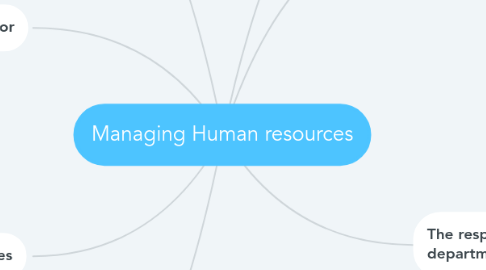Managing Human resources
da NGOC Huynh Vo Thao

1. Define
1.1. HRM consists of an organization's policies, practices, and systerms that influence employees' behavior, attitudes, and performance
2. How HRM contributes to an organization's performance ?
2.1. HRM influences employees who work for an organization
2.2. Wel-managed human resources can be a source of sustainable competitive advantage by contributing to quality, profits, and customer satisfation.
3. The responsibilities of HR department
3.1. analyse and design jobs
3.1.1. Identify clearly job responsibility, task, a duty of a position (Job description/ job requirement; Job specification )
3.2. Recruit and select employees
3.2.1. what you need and how you meet your need
3.3. Equip employees by training and developing them
3.3.1. There is a gap between the actual ability and the required ones.
3.3.2. Development: prepare for an employee career path to work for a long time
3.4. Through performance management, ensure that employees' activities and outputs match the organization's goals
3.5. Plan and administer pay and employee benefits
3.6. Engage in employee relations, communications and collective bargaining
3.6.1. relationship in the workforce, employee-employer relationship
3.7. Establish and administer personel policies and keep records
3.8. Help ensure compliance with labor laws
3.9. Support the developemnt and execution of corporate strategy
4. Type of competencies needed for HRM
4.1. Technical competencies invlove HR expertise
4.2. Interpersonal competencies are relationship management, communication and global and cultural efectiveness
4.3. Business competencies are business acumen., critical evaluation, and consultation
4.4. Leadership competencies are leadership and navigation, as well as ethical practice
5. Role of supervisor
5.1. Help analyze work
5.2. Interview job candidates and participate in selection decisions
5.3. Provide employee training
5.4. Conduct performance appraisals
5.5. Recommend pay interest
5.6. Represent the company to their employees
6. ethical issues
6.1. Should make decisons that result in greatest good forr the largest number of people
6.2. Should respect basic rights of privacy, due process consent, and free speech
6.3. Should treat others equitably and fairly
6.4. Should recognize ethical issues that rise in areas such as employees privacy, protection of employee safety, and fairness in employment practices.
7. Typical careers in HRM
7.1. Careers may involve specialized work (recruiting, training or labor relations)
7.2. Others may be generalist, performing a range of activities
7.3. Acollege degree in business or social sciences usually is required
7.4. People skills must be balanced with attention to details of law and knowledge of busineess



